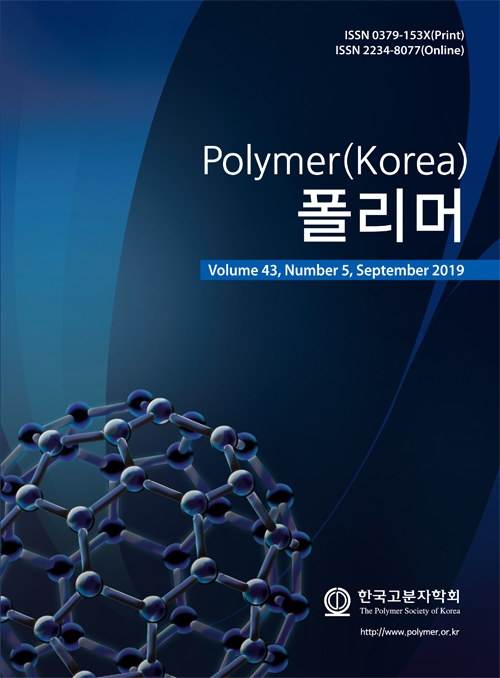- Synthesis of a Coconut Oil-based Bioplasticizer and Its Effects on the Rheological and Fusion Properties of Poly(vinyl chloride)
Department of Polymer Science and Engineering, Chungnam National University, 99, Daehak-ro, Yuseong-gu, Daejeon 34134, Korea
- 코코넛 오일 기반 바이오 가소제 합성 및 폴리염화비닐의 유변학적 및 용융학적 특성에 대한 영향
충남대학교 고분자공학과
Phthalate esters have been extensively used as plasticizers to improve the flexibility and processability of poly(vinyl chloride) (PVC) resin. However, the use of phthalate plasticizers is prohibited, and they have been replaced by non-phthalates due to the controversy over their harmful effects on the human body and the environment. Therefore, in this paper, a coconut oil-based bio-plasticizer (COBP) was synthesized via bioconversion of coconut oil using an enzyme catalyst. The rheological and fusion effects of the COBP on the PVC resin were compared with the effects of commercially available phthalate plasticizers in terms of processability, and a predictive model for correlating the mechanical and thermal properties was suggested.
프탈레이트 에스터계 가소제는 폴리염화비닐(PVC) 소재의 유연성과 가공성을 향상시키기 위해 광범위하게 사용되어 왔다. 그러나 인체 및 환경에 대한 유해성 논란으로 인해 사용이 규제되고 있으며, 친환경적이며 PVC 소재와의 가공성이 우수한 비프탈레이트계 가소제로의 대체가 증가하는 추세이다. 본 연구에서는 친환경적 가소제 개발을 위해 코코넛 오일 기반의 바이오 가소제를 생물학적 전환 공정에 의해 합성하였다. 합성된 가소제가 PVC 소재의 가공성 측면에서 유변학적 및 용융학적 특성에 미치는 영향을 상용 프탈레이트 가소제와 비교하였고, 기계적 및 열적 특성과의 상관관계에 대한 예측 모델을 제안하였다.
Keywords: coconut oil based bioplasticizer, poly(vinyl chloride), rheological effect, processability, mechanical properties
- Polymer(Korea) 폴리머
- Frequency : Bimonthly(odd)
ISSN 0379-153X(Print)
ISSN 2234-8077(Online)
Abbr. Polym. Korea - 2023 Impact Factor : 0.4
- Indexed in SCIE
 This Article
This Article
-
2019; 43(5): 778-786
Published online Sep 25, 2019
- 10.7317/pk.2019.43.5.778
- Received on Jun 7, 2019
- Revised on Jul 19, 2019
- Accepted on Jul 21, 2019
 Correspondence to
Correspondence to
- Kang Moo Huh
-
Department of Polymer Science and Engineering, Chungnam National University, 99, Daehak-ro, Yuseong-gu, Daejeon 34134, Korea
- E-mail: khuh@cnu.ac.kr










 Copyright(c) The Polymer Society of Korea. All right reserved.
Copyright(c) The Polymer Society of Korea. All right reserved.